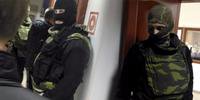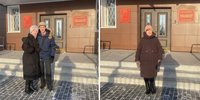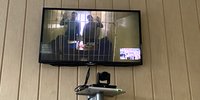The Case of Maletskov and Chaplykina in Novosibirsk
Filter
- #
The Investigative Department of the FSB of Russia for the Novosibirsk Region is initiating a criminal case against believers - 65-year-old Alexander Seredkin, 45-year-old Valery Maletskov and 48-year-old Marina Chaplykina under Parts 1 and 2 of Article 282.2 of the Criminal Code of the Russian Federation. According to investigators, Seredkin "organized meetings and supervised the reading and discussion of literature recognized as extremist." Maletskov and Chaplykina are accused of participating in the activities of a banned organization.
- #
The Oktyabrsky District Court refuses the investigator's request to place Alexandr Seredkin and Valeriy Maletskov in custody. Instead, they are put under house arrest. A recognizance agreement is signed by Marina Chaplykina.
- #
- #
- #
Selyunin, a senior investigator for the Department of Internal Affairs of the Federal Security Service of Russia in the Novosibirsk Region, initiates a new criminal case against Marina Chaplykina under the article on financing extremism. After a few days, it is connected to the current one.
- #
The case of Alexander Seredkin is separated into a separate proceeding.
- #
Believers receive an indictment. Valeriy Maletskov is accused of organizing an extremist organization, and Marina Chaplykina is accused of participating in it and financing it.
Marina Chaplykina is charged, among other things, with the fact that she "paid from personal funds to a representative of an individual entrepreneur ... monetary remuneration in the amount of 1500 rubles for the lease of non-residential premises ... to hold a solemn religious meeting with followers of the doctrine of Jehovah's Witnesses."
The accusation is based on recordings of conversations with believers made by a secret witness "Ivan", who attended meetings of Jehovah's Witnesses. Also in the case are the testimonies of the security forces who carried out the ORM: A. Abakumov, deputy head of the CPE department of the Main Directorate of the Ministry of Internal Affairs of Russia for the Novosibirsk Region, S. Mezentsev, an employee of the Economic Security Department, and G. Lazarev, an operative of the FSB.
- #
The case goes to the Novosibirsk District Court of the Novosibirsk Region. He is appointed to judge Oleg Karpets.
- #
The Novosibirsk District Court begins consideration on the merits of the case of Valery Maletskov and Marina Chaplykina.
- #
About 25 people come to the courthouse to support the believers. 12 listeners are allowed into the hall.
The court summons for questioning a witness for the prosecution, which uses Article 51 of the Constitution of the Russian Federation. She also states that during the preliminary investigation she testified under pressure during the interrogation.
The judge grants the prosecutor's request to summon the FSB investigator who conducted the interrogation.
- #
About 30 people come to support the believers, 12 of them are allowed to attend the hearing.
A prosecution witness, an FSB investigator, is being questioned. He denies exerting pressure on a witness during interrogation at the preliminary investigation stage.
The prosecutor shall request the disclosure of the testimony of the witness. The defense objects. The court decides to read out her testimony.
- #
17 people come to the court session to support the believers.
A prosecution witness who attended worship services of Jehovah's Witnesses before 2017 is being questioned. He describes Maletskov as a respectable family man and a highly moral, reliable person who can be relied upon. The witness also notes that both Maletskov and Chaplykina respect the laws of the country, and he has never heard from them calls to undermine the constitutional order or security of the state, negative statements towards people of other religions, nationalities and cultures.
- #
The court is interrogating Valery Maletskov's boss. The witness has known Valeriy as his subordinate for 9 years. She says: "He has proven himself to be a responsible, reliable and hardworking worker. We had no complaints about him." She also notes that although she herself belongs to another religious denomination, Maletskov never showed arrogance either towards her or towards others, and never exerted moral pressure on anyone.
- #
16 people come to support the defendants.
Prosecution witnesses are being questioned. "Marina is a very sympathetic person, decent. My mother was bedridden, sick. She [Marina] has always supported me," says one of them.
Another witness does not personally remember the defendants. Four witnesses who have known the defendants for several years describe them as respectable, open and friendly people. They confirm that believers have never shown any hostility towards people of other religions, nationalities, cultures.
A witness who has attended worship meetings of believers informs the court that they do not have a mandatory collection of funds, and those present treat each other with love.
- #
The court is questioning another prosecution witness, an operative who has been feigning interest in the Bible for six months.
Witnesses for the prosecution tell the court that they have not heard negative statements from the defendants about people of other nationalities and other religions. Also, believers never encouraged them to stop communicating with work colleagues or stop celebrating holidays.
- #
14 people come to the courthouse to support the defendants, 11 are allowed to attend the hearing.
The court interrogates a witness for the prosecution - FSB operative Grigory Lazarev. The witness finds it difficult to answer the defendant's questions, including when, where, from whom and how much money Maletskov collected.
- #
30 people come to the court hearing, 14 are allowed into the courtroom.
The secret witness "Ivan" does not appear at the hearing, and the court proposes to proceed to the study of the written materials of the case. The defendants object, and the hearing is adjourned for subsequent questioning of the classified prosecution witness.
- #
The secret witness "Ivan", who attended meetings of believers from 2014 to 2015, that is, long before the period imputed to the defendants, is being interrogated.
Maletskov and Chaplykina draw attention to the fact that the witness answers questions unintelligibly. The court insists on the continuation of the interrogation and satisfies the prosecutor's request to read out the testimony of the witness given during the preliminary investigation.
"Ivan" informs the court that he has not heard any calls from the defendants Maletskov or Chaplykina for disrespect for state bodies, as well as for refusal to perform military service.
When asked whether the Supreme Court of the Russian Federation banned the doctrine of Jehovah's Witnesses, the witness replies that he is not aware of it and is not interested.
- #
The judge satisfies Maletskov's request for a detailed study of the case materials. The Court is considering the first two volumes.
Chaplykina says that, contrary to the allegations of the prosecution, she cannot be a "ministerial assistant", since according to the Bible it can only be a man with a good reputation.
Maletskov draws the court's attention to the fact that in the transcript of the service there is not a single statement that detracts from dignity or incites hatred. Instead, it emphasizes the attributes of Jesus Christ and the importance of gratitude.
- #
The study of the case materials continues.
In response to "Ivan's" statement that Jehovah's Witnesses destroy families, Marina Chaplykina notes that according to the Bible, marriage is a sacred union that biblical principles strengthen, not destroy.
Valery Maletskov draws attention to the fact that the religious literature seized from him during the search is not included in the list of extremist materials, however, in his opinion, the prosecution indirectly states that the very fact of having biblical literature is a crime.
He also draws the court's attention to the fact that the case file contains protocols of searches that were carried out at addresses where he had never been, and the literature and objects seized there do not belong to him. At the same time, they are used as material evidence.
- #
In the course of the study of the seventh volume, the defendants Maletskov and Chaplykina draw the court's attention to the fact that they had informal conversations with "Ivan" about the Bible, which were exclusively peaceful in nature. Marina also says that during such conversations she did not use literature from the list of extremist materials.
- #
Chaplykina draws the court's attention to the fact that when communicating with Sergei Mezentsev, there was no hint anywhere in her words, especially phrases about asking for money, which he had previously spoken about. Marina also notes that in the transcripts of volumes 7-9 of the case there are practically no her words, there is no talk of meetings of the LRO, calls for violence and the overthrow of the government.
Maletskov points out that the expert Lugovoi, on the basis of whose conclusions the accusation is based, does not have a religious education, there are no specifics in his conclusions, but only subjective and generalized conclusions.
- #
The ninth volume of the case materials is being examined.
Maletskov tells the court that the prosecution has no specific facts of "recruitment" and "expression of the superiority of the doctrine of Jehovah's Witnesses." He notes that the investigation replaces the concepts of "doctrine" and "organization".
- #
In her comments to volume 11 of the case, Chaplykina draws the court's attention to the fact that no liturgical meetings took place at her home in 2019, and she was detained not at home, but in a café. No extremist literature or receipts for monetary collections were found in her home, because she never distributed literature or collected money.
- #
The written materials of the case from volumes 11-13 are examined, including the positive characteristics of the police and neighbors on Chaplykina.
Maletskov explains the difference between the canonical expression "organization of Jehovah", which is present in the case file, and the name of the legal entity of Jehovah's Witnesses in Novosibirsk. Maletskov says: "'Jehovah's organization' is a purely religious formulation, from which it follows that we are talking about an organization belonging to Jehovah, which is not limited to the territory of Russia, but concerns the entire globe."
- #
The court continues to examine the materials of the case and partially hears audio files of the services. Valery Maletskov draws attention to the child's voice that is heard on the recordings, and emphasizes that this event cannot be considered a meeting of a legal entity if children are present at it.
Marina Chaplykina asks for the study of the video file from the case materials. It contains a recording of a personal conversation between believers and Sergey Mezentsev, where they also discuss the video "Social networks. Marina explains to the court that the video does not contain negative statements and is not on the list of extremist materials. The believer also says that there was no pressure on Mezentsev.
39 people come to the court hearing. 16 of them are allowed into the meeting room.
- #
The study of the case materials continues.
Earlier, in his testimony, witness Mezentsev stated that it was not the Bible that was discussed with him, but forbidden literature. However, video files show that passages from the Bible were discussed and read out everywhere. Mezentsev also claimed that all meetings with the defendants were of a recruiting nature in order to involve him in a religious organization. However, in the videos, Chaplykina encourages the witness to figure it out for himself and decide which religious views to adhere to.
When asked by Maletskov whether all the literature of Jehovah's Witnesses is extremist, Mezentsev replies: "Yes." Valery draws attention to the list of banned publications approved by the Ministry of Justice, as well as to the fact that the publications previously considered in court, including videos, are not included in this list.
- #
The prosecutor refers to the testimony of prosecution witnesses and a secret witness and asks to take into account mitigating circumstances, namely the fact that Valery Maletskov has a dependent young child, as well as a mother suffering from a serious illness; Marina Chaplykina is in poor health.
Nevertheless, the prosecutor asks to impose punishment: Maletskov 7 years of imprisonment in a penal colony of general regime with deprivation of the right to engage in organizational activities in public and religious associations for a term of 5 years with restriction of liberty for a term of 1 year;
Chaplykina was sentenced to 5 years and 6 months of imprisonment in a general regime penal colony with restriction of liberty for a term of 6 months.
Believers deliver the last word.
Marina Chaplykina's last word in Novosibirsk The last word of the defendant Valery Maletsky in Novosibirsk - #
- #
In the 5-bed cell, Marina Chaplykina has her own bed. She has the opportunity to go for walks. The believer has a Bible. She also receives letters of support. She has respectful relations with the administration and other prisoners.
- #
At the request of the defense, the case is returned to the court of first instance so that the defendants can familiarize themselves with the materials in more detail.
The judicial board agreed with the arguments of the lawyer and the defendants that the judge of the first instance allocated too short periods of time to get acquainted with the documents, which is a significant violation.
While waiting for an appeal, the believers had already spent six months in the pre-trial detention center.
- #
There are 6 more people in the cell with Valery Maletskov. They treat him with respect as he is the eldest among them. For his personal qualities and behavior, he received the nickname "intellectual". The attitude of the staff of the detention center is also good. The conditions in the cell are not bad. There is a TV, but no refrigerator. He does not complain about his emotional and physical condition. He has a Bible that he reads regularly. Valeriy is also engaged in the study of English.
- #
- #
Marina Chaplykina arrives at IK-9 in the Novosibirsk region to serve her sentence.
- #
Marina Chaplykina is getting used to the routine in the penal colony. Adapting to the new conditions was not easy for her, especially in the first weeks.
The believer lives in a unit of about 90 people. Living conditions are generally satisfactory, although it is cold in her section. She helps to improve the grounds and has signed up for an applied arts club.
The attitude of the staff and other prisoners toward Marina is generally respectful.
Marina has been suffering from severe coughing and hoarseness for about four months. So far, the administration has not returned the medicines that she brought from the detention center. In addition, it is very difficult to get an appointment with a doctor.
- #
Valeriy misses his family and worries about his teenage son, as he cannot fully participate in his upbringing. Letters of support and regular visits from his wife, son and mother help him not to lose heart.
Valeriy has established a well-organized routine in the cell. Everyone maintains cleanliness and order; the cellmates agreed to smoke only in a designated area so that cigarette smoke harms the believer as little as possible.
- #
Valeriy Maletskov is in penal colony No. 3 for the Novosibirsk Region.
- #
Valeriy has a Bible from the library in the penal colony and an English language tutorial.
Recently, he had a short visit from his wife.
- #
Valeriy has good relations with other prisoners. He regularly calls his wife, son and mother. The believer misses home and loved ones. He recently got a short visit with his family.
- #
The Eighth Court of Cassation of General Jurisdiction in Novosibirsk upholds the verdict, and the cassation appeals are denied. The believers will continue to serve their sentences in penal colonies.
- #
In mid-August, Maletskov spent 5 days in a punishment cell: according to Valeriy, prohibited items were planted on him, which were then found during an inspection.
Since August 20, the believer has been held under strict conditions. He receives letters of support irregularly — for the entire time in the penal colony, he was given only about 50 letters. Emails do not get through. Recently, Valeriy had his first extended visit from his wife.
- #
Since July, Marina Chaplykina has been working in the sewing workshop 6 days a week. Working hours are set until 5:00 p.m., but they are often extended to 8:00 p.m. if prisoners do not succeed in completing the assigned work. On Sundays, the believer is required to participate in cleaning and taking care of the territory. Due to this schedule, she gets exhausted.
Since arriving at the penal colony in April 2025, Marina has received about 50 letters (as many as the average number of letters received in the pretrial detention center per week). Recently, she was transferred to another unit, where there is hot water and heating.
- #
Marina Chaplykina spent 14 days in a punishment cell because of a fabricated violation.



